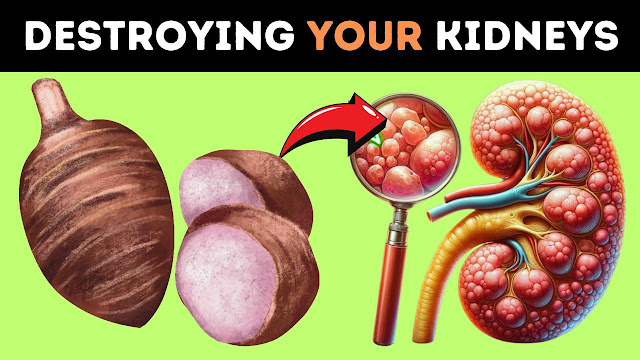These 10 Foods Are Destroying Your KIDNEYS || 10 Foods to Eat or Avoid If You Have Kidney Disease
These 10 Foods Are Destroying Your KIDNEYS: The Main ENEMIES of Your KIDNEYS We Constantly Consume
Title: Unveiling Hidden Health Hazards in Common Foods
Welcome to our in-depth exploration of the unsuspected health risks hidden within some of the most common foods. Today, we embark on a journey to uncover ten surprising culprits that could potentially endanger kidney health. Let's delve into the specifics of these hidden dangers and discover beneficial practices to safeguard your well-being.
1. Rhubarb:
Rhubarb, known for its tangy flavor often utilized in desserts, conceals a significant threat to kidney health—oxalate. This natural compound, abundant in rhubarb, has the propensity to foster the formation of kidney stones, leading to excruciating pain. Moreover, the leaves of rhubarb contain even higher levels of oxalates, posing a toxic risk if ingested.
2. Beet Greens:
Similarly, beet greens, celebrated for their nutritional richness, harbor high levels of oxalates, exacerbating the risk of kidney stone formation. Despite their commendable nutrient profile, excessive consumption of beet greens can escalate kidney stone risks, especially among predisposed individuals.
3. Taro and Cassava:
Staple foods like taro and cassava, revered for their versatility and nutritional value, harbor a hidden danger—cyanogenic glycosides. These compounds, if not properly prepared, can release cyanide in the body, posing a severe health threat. Thorough cooking is imperative to neutralize these toxins and prevent potential toxicity.
4. Black Licorice:
Despite its innocuous appearance, black licorice contains glycyrrhizin, a compound that can disrupt potassium balance in the body. Regular consumption of black licorice can lead to potassium imbalances, triggering health issues like high blood pressure and even cardiac arrest.
5. Peanuts:
Peanuts, a popular snack enjoyed worldwide, come with their own set of risks for kidney health. High in oxalates, these legumes can contribute to the formation of kidney stones, particularly problematic for individuals with kidney-related issues.
6. Artificial Sweeteners:
Long-term consumption of artificial sweeteners, often used as sugar substitutes, has been linked to potential kidney function decline. Despite their appeal for reducing calorie intake, these sweeteners may silently impact kidney health, underscoring the importance of moderation.
7. Star Fruit:
The exotic star fruit, with its distinctive star shape and refreshing taste, harbors a shocking secret—neurotoxins. While usually processed without issue by healthy kidneys, these toxins pose a significant risk to individuals with compromised kidney function, potentially leading to neurological issues and fatal outcomes.
8. High Phosphate Packaged Foods:
Packaged foods, commonly underestimated in terms of their impact on kidney health, often contain high levels of phosphates. For individuals with kidney disease, the struggle to filter out excess phosphates can lead to severe health complications, necessitating careful dietary choices.
9. Excessive Vitamin C Supplements:
While vitamin C is renowned for its immune-boosting properties, excessive intake of vitamin C supplements can result in the formation of oxalate kidney stones. Consuming doses exceeding the recommended daily amount significantly elevates the risk, highlighting the importance of moderation.
10. High Doses of Green Tea Extracts:
Green tea extracts, celebrated for their antioxidant properties, can harbor high concentrations of oxalates, contributing to kidney stone formation. When consumed in large quantities, these extracts pose a significant risk to kidney health, especially for predisposed individuals.
Now, let's explore three beneficial practices for maintaining optimal kidney health:
1. Seek Healthy Alternatives:
Opt for kidney-friendly alternatives such as apples, bananas, cauliflower, and lean proteins while minimizing intake of high-oxalate and high-phosphate foods.
2. Follow Safe Consumption Instructions:
Practice moderation and ensure proper preparation techniques for foods with potential health risks to mitigate adverse effects and safeguard kidney health.
3. Consider New Dietary Strategies:
Adopt dietary strategies including reducing salt intake, balancing protein consumption, and monitoring potassium and phosphorus levels to support optimal kidney function.
In the closing moments of our video, remember: knowledge is power when it comes to safeguarding your kidney health. Take charge of your diet, stay informed, and make mindful choices. Like, subscribe, and share to spread awareness and empower others on their journey to better health. Together, let's prioritize kidney health and live our best lives. Thank you for watching.



No comments:
Post a Comment